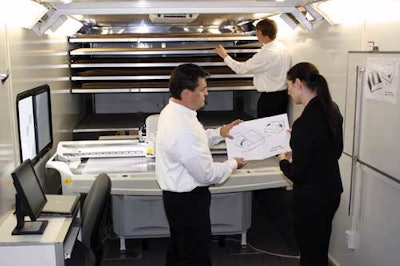Retail-ready packaging is fast becoming a preferred marketing tactic as retailers and consumer packaged goods companies scramble to satisfy fickle consumer purchase motivations, which can turn on a dime. In more aisles of the store, retail-ready packaging is becoming a game-changer, and Morton Salt provides a great example of how this trend is playing out in club stores.
The Chicago-based manufacturer of food salts has noted a shift to more at-home cooking, which has stayed with many consumers even as the economy has improved. That trend has opened doors to Morton Salt to expand its salt presence in club stores by rethinking its approach to product merchandising, giving rise to new retail-ready trays of the company’s table salt.
What makes Morton Salt’s approach to retail-ready packaging innovative is how and where the versatile trays are designed and made. The company owes its success to a “Design on Wheels” lab that brings design and production right to the company’s doorstep. The patented mobile lab, created by Menasha Packaging, takes the displays from design to concept in just one day. It provides on-site assistance with package and tray design, pack-out, assembly line modifications, performance issues, cube utilization, packaging audits, and lean-manufacturing solutions.
The ingenuity of this approach enables Morton Salt to very quickly get the trays into club stores where they either can be wheeled directly to the sales floor on display pallets or placed individually on shelves. The result is an all-around effective response to consumer and retailer demands for ever-changing product assortments and packaging formats that compel shoppers to make frequent return visits.
Morton Salt’s trays are designed exclusively for club stores, where they have been rolling out in the first half of 2011. Mostly, they’re earmarked for display pallets. Each pallet contains 504 4-lb cartons, a departure from the company’s rounded, 26-oz containers familiar to shoppers in grocery stores. The club-store cartons are packed 12 to a case, and seven cases in each of the pallet’s six layers.
“With a traditional approach, it would have taken months, weeks at least,” to produce them in a normal linear approach, says Jon Burdette, marketing manager for Morton Salt.
Window of opportunity
One impact of the recession, and the increased presence of cooking-related television shows, is that consumers have become reacquainted with their kitchens and are preparing more meals at home. The shift to at-home cooking has stayed with many consumers even as the economy has improved. It also has created opportunities for club stores to grab a larger market share for staple food items such as cooking salt.
That trend is a boon to food product marketers such as Morton Salt. The company has been looking to increase business in club stores, which account for 9% of all cooking salt sales in the U.S. “We believe we have room to grow in that market,” Burdette says.
When Morton Salt decided the time was right to introduce its table-salt brand in retail-ready packaging in club stores, it enlisted the help of Menasha Packaging’s mobile lab. Though many vendors talk about closer relationships with consumer packaged goods companies, Menasha literally delivers the goods by putting its patented Design on Wheels lab on the premises at Morton Salt. The mobile, full functioning lab includes a 10-kilowatt generator, a CAD workstation to create 3-D renderings and 2-D design, and a custom sample cutter that enables designers to provide samples for review and revision on-site.
Menasha’s team recently anchored the Design on Wheels lab at Morton Salt’s facility in Rittman, OH. By the end of the day, it had created retail-ready trays that not only meet club store guidelines but that also can run on the salt manufacturer’s existing production line.
Doug Orischak, Menasha’s design and graphics manager, says that the lab offers measurable benefits in the form of quick and efficient turnaround times, which is essential for competing at retail today.
“I’ve been at this for 25 years,” Orischak explains. “Twenty-five years ago, it would have taken just two weeks to turn samples around for the customer. Often, CPG companies don’t have that luxury today. Retailers are driving speed-to-market. They’ll tell the product manufacturers, ‘I have an open pocket in my shelf scheduling. What can you do for me?’ So the product companies, in turn, are looking at vendors for solutions to help them plug these gaps.”
Challenges laid out
Morton Salt previously did not have a retail-ready design for its table salt. The challenge was a display that would meet club store guidelines, be visually appealing to consumers, and literally enable store personnel to position the pallet and walk away, thereby reducing labor costs. On top of that, Morton Salt required that the packaging be compatible with its existing production line and offer a case pack holding as much product as possible to provide consumer value.
“The machinery was the biggest challenge,” Burdette says. “The existing machinery was built to pack an entirely different form of case. But we knew we didn’t want to pack this up off-line and interrupt our regular workflow.”
An off-line operation would have required three steps: unpacking product from master cartons, allocating adequate floor space, and then packing the cartons into the trays and then assembling the pallets by hand in a staging area. “Hand-packing it would have taken three times as long as the solution we came up with,” Orischak estimates.
Morton Salt’s equipment holds 12 table salt cartons that load into their existing case. The company asked Menasha to design a versatile, 12-pack tray that could be used in existing machinery and also move from pallet to shelf in stores, without increasing the case size.
Menasha came up with a 12-pack tray with an integrated cover and edges that tear away easily, resulting in minimal waste when the display pallets are set up and also as the pallets sell down. Consumers can shop the display pallets from three sides, and they’re attracted to the signature Morton Salt Girl icon, prominently highlighted along with white graphics against the brand’s well-known blue background.
“The clubs saw an opportunity for us,” Burdette says. “Salt is becoming a staple of gourmet cooking. We need to be where they’re shopping and in the ways they are shopping. The packaging does a lot of work.”
Completed trays stack seven per layer on a 504-count Pack-N-Stack pallet measuring 475⁄8” high, 191⁄4” wide, and 125⁄8” deep. Individual stores have the merchandising option of keeping the trays in pallet form or displaying them on shelves.
Single-day operation
Menasha took the design for the display pallets from concept to running on Morton Salt’s line in one day. Jim Harkins, Menasha’s senior national accounts manager, describes a collaborative effort that includes the plant’s management and line personnel to make the project successful.
Burdette adds that not everyone at Morton Salt was sold initially on the on-site approach. “One of our line workers was a little skeptical about shutting down the line for a whole day, and thought it might put him behind. But by the end of it, he was hooked. We had 10 people around the machine trying to figure it out, and there was applause and cheers when we finally did.”
Orischak adds that a project similar to Morton Salt’s display-ready packaging could require weeks if done in a conventional lab. It would take longer for such requirements as the multiple back-and-forths for reviews and revisions to samples.
“With Design on Wheels,” Orischak concludes, “we can make a change, run it on the line, and see what the impact is. If it currently takes two minutes to pack a box and we make a change that cuts it to one minute 30 seconds, we can put a dollar value on that right then and there. If it doesn’t work, we can immediately fix it.”


















